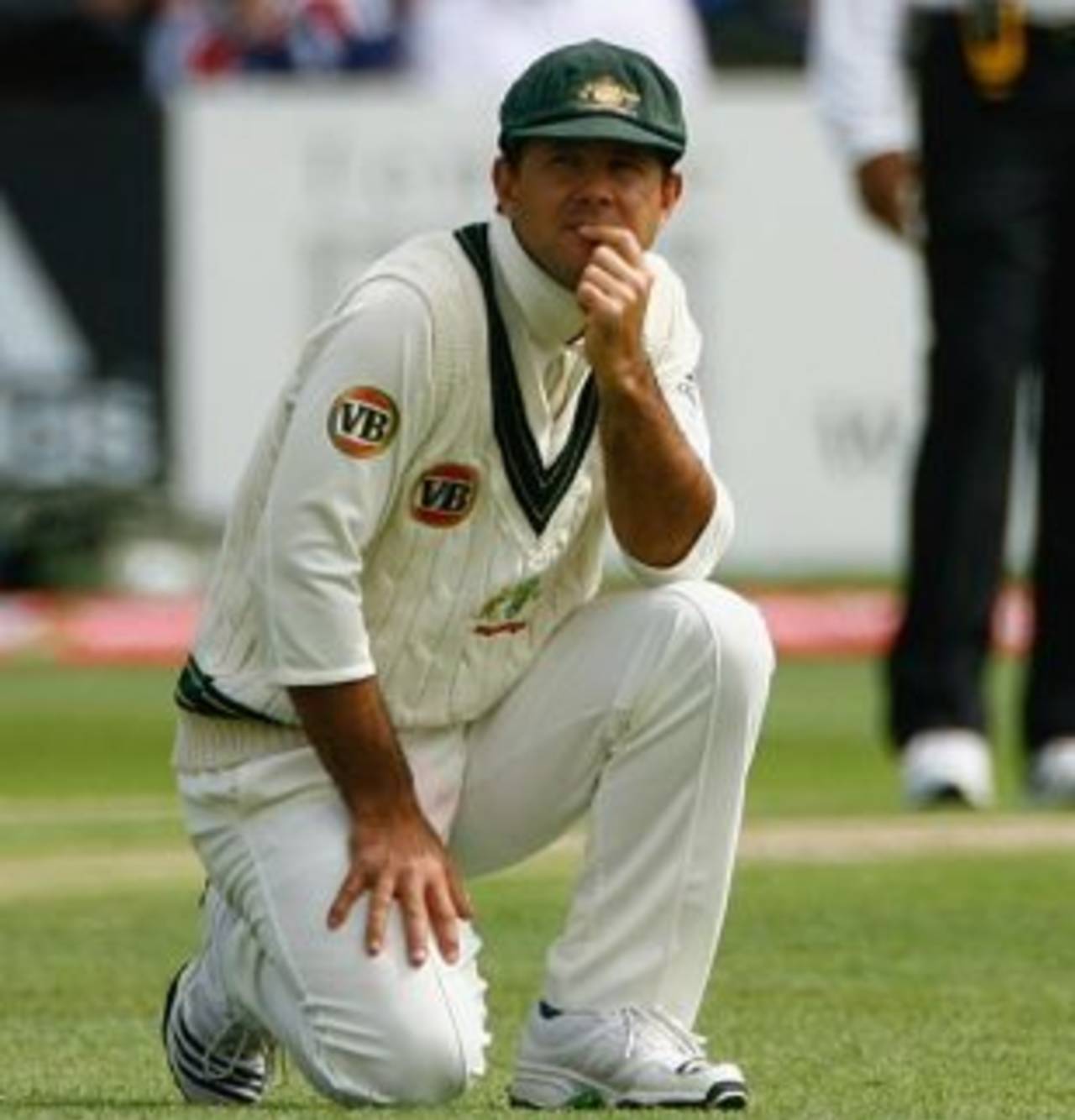Hilfenhaus lifts defensive Australia
Australia outdid themselves by benching Stuart Clark, but Ben Hilfenhaus ensured Australia's day wasn't entirely dominated by defensive tactics from Ricky Ponting
Alex Brown at Cardiff
Jul 8, 2009, 7:40 PM

'Commentators, including Ian Chappell, were underwhelmed at Ponting's tame field settings, while others questioned the defensive mindest of bowling Clarke, a part-timer, for five overs in the second session of an Ashes series' • Getty Images
Most assumed Steve Harmison's record for earliest Ashes shock would never be bettered after his opening delivery of the 2006-07 series angled its way to an unamused Andrew Flintoff at second slip. But Australia, ever the innovators, went one better on Wednesday, stunning all and sundry before a ball had been bowled by benching Stuart Clark, the leading wicket-taker of the corresponding series two years ago, in favour of a four-man attack with precisely zero Ashes Tests to their name.
The move to elevate Ben Hilfenhaus was widely expected, given Brett Lee's injury and predictions of heavy atmospheric conditions in Cardiff this week. Though omitted from Australia's final warm-up match against the England Lions in Worcester, Hilfenhaus's conventional swing and bustling pace were viewed as desirable assets against an England batting line-up yet to establish itself as an international force.
Nathan Hauritz, however, was another matter entirely. If, as one theory goes, selectors should pick their best four bowlers irrespective of conditions, then Hauritz's record of 2-260 from 68.2 overs in Australia's two tour matches did not compare with Clark's 5-151 from 50. His lack of penetration in those matches provided selectors with few grounds for optimism, particularly as they were played on slow, holding pitches similar to the current Sophia Gardens strip against opposition inferior to that offered by England.
Clark, undoubtedly, is a force subdued on sluggish pitches, where his generally awkward bounce carries at a less threatening height, but his metronomic accuracy can asphyxiate even the most resolute of batsmen. Still, Australia opted to play for balance and conditions, and the first surprise of this series was sealed before a coin had been flipped. A new Ashes record.
Hilfenhaus immediately justified the faith of Andrew Hilditch with an energetic opening spell that yielded the wicket of Alastair Cook. His union with the hard-charging Peter Siddle appeared the most threatening of the morning - the latter roughed up Ravi Bopara and troubled right-handers with inward angling deliveries - but it was Mitchell Johnson who proved the most prolific with the scalps of Strauss and Bopara.
The dismissal of Strauss to a brutish, tailing bouncer was comfortably the highlight of Johnson's outing, which was otherwise notable for a low arm action and, on occasion, a lower head. The intimidating, talismanic paceman of South Africa seldom surfaced on Wednesday, replaced by a throwback model whose lack of lateral movement and periods of inaccuracy blunted his effectiveness. Still, Australia's prevailing mood was one of optimisim entering the lunch break, with England's top three back in the pavilion and a jittery Kevin Pietersen to resume.
It would not last. Twice in as many hours, Australian fans hollered "why, why, why?" into the ether - the first on account of a Welsh warbler's rendition of "Delilah", the second due to a numbing session of play in which Hauritz and Michael Clarke were deployed for an extended period to little effect. Commentators, including Ian Chappell, were underwhelmed at Ponting's tame field settings, while others questioned the defensive mindset of bowling Clarke, a part-timer, for five overs in the second session of an Ashes series.
Hauritz was by no means disgraced, but neither was he threatening after lunch. Extracting subtle turn from the first day wicket, Australia's oft-criticised spinner was treated with more reverence than in the previous two tour games, albeit at a time when the England run-rate ticked along steadily. His judgement will be deferred until the second innings, when footmarks and a loosening surface should suit, but given his recent history, there must be concern among the Australian camp as to whether he can get the job done.
Hauritz will at least be buoyed by the wicket of Pietersen, claimed not so much out of spin or flight but rather the lamentable decision-making of the batsman. Scorecards aren't so judgemental, though, and the wicket of Pietersen, coupled with that of Paul Collingwood to Hilfenhaus five overs early, rekindled Australian confidence at a time when the day appeared to be lurching England's way.
The tourists' spirits were lifted further in the final hour when Siddle and his internal V8 engine returned for the wickets of Andrew Flintoff and Matt Prior. Guilty of straying onto the pads in his earlier spells, Siddle tightened his line and troubled England's batsmen with a full length and swing into the right-handers. Such levels of skill and tenacity are generally associated with spearheads, and it would not surprise if Siddle assumed that mantle from Johnson before the series is out. Hilfenhaus might also have something to say on the matter; the old-ball swing generated in his final spell was Alderman-esque on occasion.
Alex Brown is deputy editor of Cricinfo